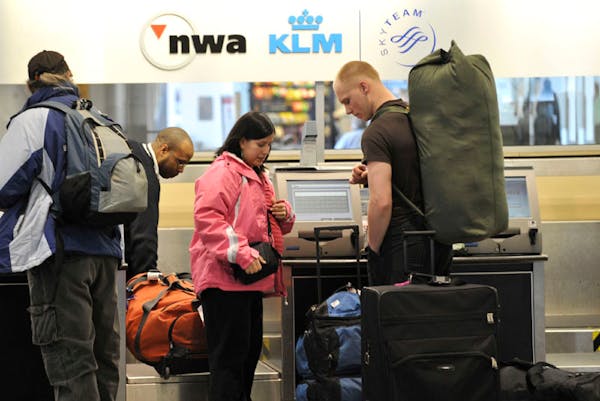Wall Street pressured Delta Air Lines and Northwest Airlines for months to propose a merger. Now that the airlines finally have unveiled one, it's getting a chilly reception.
Shares of Delta plummeted more than 12 percent Tuesday as investors reacted to Monday night's merger announcement. Northwest shares dropped more than 8 percent.
"It's very unusual for the price of both stocks to go down" in a merger, said Bruce Engler, head of the mergers and acquisitions practice at Faegre & Benson in Minneapolis.
Both companies saw a brief early rise in their stock prices, but the shares hit their low points shortly after the companies had a joint conference call with analysts. That suggests Delta and Northwest executives left some listeners skeptical that the promised savings and revenue benefits from the merger would counter the effect of soaring fuel costs.
"People were looking at the considerable costs up front and the prospect that the benefits [of the merger] may be two, three, or even four years down the road," said Ray Neidl, an analyst at Calyon Securities in New York. "Some investors decided to take their profits."
"Investors aggressively voiced their disappointment for a deal thought to underdeliver on synergies and capacity cuts," J.P. Morgan's Jamie Baker said in a report Tuesday.
During the conference call, Neidl told the executives that most previous airline mergers had proven to be "a disaster" in the first year or two.
Delta CEO Richard Anderson replied: "Not all mergers are created equal."
He said Delta and Northwest turned in strong financial performances in 2007, have low cost structures and "have already progressed down the road of integration."
He pointed out that for years, the two carriers have had a domestic code-sharing arrangement, so the airlines' scheduling and pricing systems are already "hooked up." They also have reciprocal frequent-flier programs, and the two airlines already have invested tens of millions of dollars to make it convenient for passengers to travel on Sky Team alliance carriers. Northwest and Delta are members of that international alliance.
Northwest CEO Doug Steenland said: "The economics of the merger are based on expanding the scope of the network, improving the utilization of our aircraft fleets and combining functions such as information technology to achieve greater efficiencies."
Julius Maldutis, a former longtime Wall Street analyst, said there are several reasons that the two stocks dropped Tuesday, including the fact that oil rose again. He said investors also are reacting to the considerable political opposition to the deal.
U.S. Rep. Jim Oberstar, D-Minn., is leading the pack of opponents in Congress. The chairman of the House Transportation and Infrastructure Committee said Tuesday that "mergers and the resulting reductions in competition often lead to higher fares, deterioration in service and financially weakened surviving airlines."
Steenland said that "because there is very little overlap between our route systems, the impact of the merger on competition will be little, if any."
Oberstar and other House and Senate members can raise issues, but the Department of Justice will have the final say on whether the proposed merger is anticompetitive.
Maldutis noted that investors also are jittery because, "Anderson reached an agreement with his pilots and left out the Northwest pilots."
And even though the Delta pilots' contact is set, the two airlines' pilots still are in a tough struggle over seniority issues.
"Labor isn't always in the same boat as management, and in this case it might even be trying to sink it," Neidl said.
Steenland and Anderson said it is their intention to try to resolve the pilot issues by the end of the year, when they expect to receive Justice Department approval and close the merger deal.
Steenland said that the merger would provide greater job security for Northwest employees over the long haul, because it would create "a stronger, more-resilient airline" that could withstand high oil prices.
Bob McAdoo, an analyst for Avondale Partners, said in a report that the merger "is billed as yielding $1 billion in benefits without cutting hubs or cities. We believe there are more benefits coming than the companies predict."
Steenland and Anderson said cost savings will be achieved and revenue boosted by better deploying airplanes to the most suitable routes.
The combined carrier would have nearly 800 mainline jets and maintain both Boeing and Airbus fleets.
Maldutis said the world's largest carrier would have tremendous leverage when negotiating prices for new airplanes and the new Delta would get frequent sales calls. Maldutis quipped, "The two major global aircraft manufacturers will be licking their chops and will be on their doorstep to give them a great deal."
Staff Writers Conrad Wilson and Kevin Diaz contributed to this report.
lfedor@startribune.com sfeyder@startribune.com
Susan Feyder • 612-673-1723 Liz Fedor • 612-673-7709
